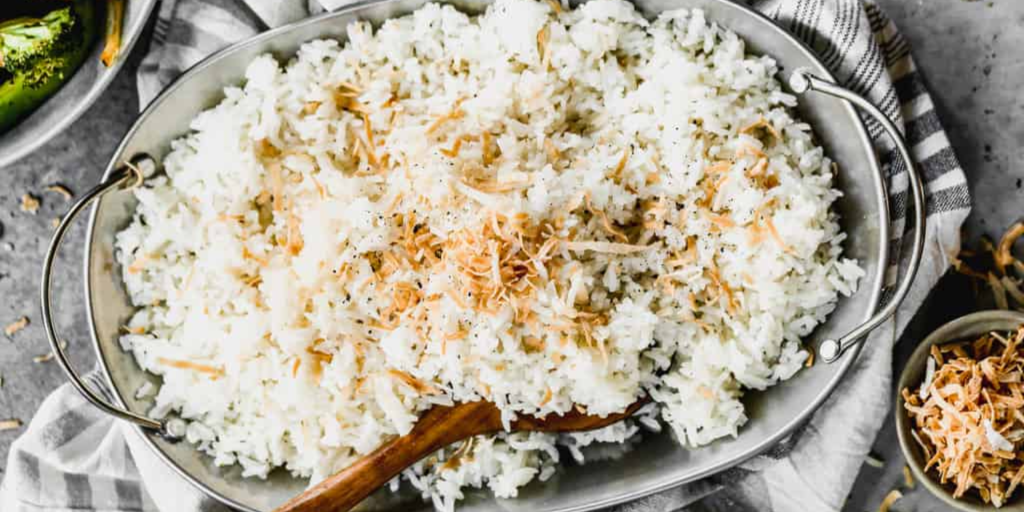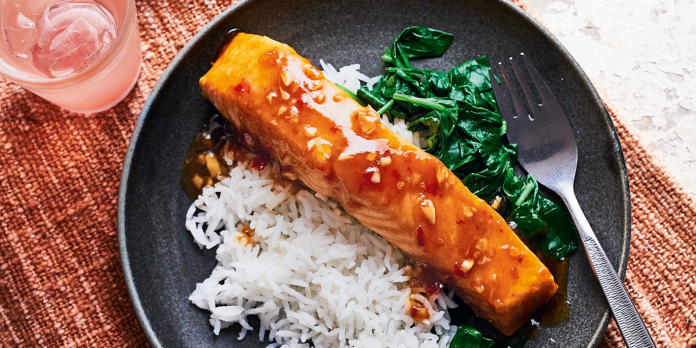Table of Contents
Coconut rice, a delightful dish rooted in tropical culinary traditions, goes beyond mere culinary enjoyment. It emerges as a champion of sustainability, offering a myriad of environmental benefits that make it a conscientious choice. In this article, we’ll explore the sustainable aspects linked with coconut rice, shining a light on how its production, ingredients, and consumption contribute to a greener and healthier planet.
In the culinary realm, where flavors meld with nutritional benefits, coconut rice stands out as a timeless classic that continues to captivate palates and promote wellness. As we embark on a journey to uncover the best health benefits of coconut rice in the year 2024, we find ourselves immersed not only in the creamy richness of its tropical essence but also in the myriad ways it nourishes our bodies and elevates our well-being.
Coconut rice, born from the lush landscapes of tropical regions, epitomizes the marriage of flavor and health, drawing inspiration from the bounty of nature to create a dish that delights both the senses and the body. Its foundation lies in the simple yet powerful combination of fragrant rice and creamy coconut milk, a symphony of taste and texture that transports us to sun-kissed shores and verdant palm groves with every savory bite.
But beyond its exquisite taste and exotic aroma, coconut rice harbors a wealth of health benefits that make it a cornerstone of nutritious eating in 2024. Packed with essential nutrients, including vitamins, minerals, and healthy fats, coconut rice offers a nourishing feast for the body and mind. From supporting digestive health and boosting immunity to promoting cardiovascular wellness and enhancing cognitive function, the nutritional prowess of coconut rice extends far beyond its delectable flavor profile.
As we delve deeper into the health benefits of coconut rice in 2024, we are poised to uncover the secrets of its nutritional superiority and its potential to transform our health and vitality. From its role in stabilizing blood sugar levels to its anti-inflammatory properties and its ability to nourish skin and hair from within, coconut rice emerges as not just a culinary delight but also a powerhouse of wellness in every grain.
Join us on this exploration of the health benefits of coconut rice in the year 2024 as we celebrate the fusion of flavor and nutrition, tradition and innovation, that defines this beloved dish. Prepare to indulge in a culinary adventure that nourishes the body, delights the senses, and celebrates the best of both worlds in the ever-evolving landscape of modern nutrition.
Synergetic Farming Methods

The journey of coconut rice begins with the cultivation of two essential ingredients: rice and coconuts. Many coconut rice recipes emphasize the use of sustainable, organic rice varieties. Farmers embracing agroecology and organic farming methods steer clear of synthetic chemicals, prioritizing soil health. By incorporating eco-friendly farming practices, rice cultivation for coconut rice becomes a component of a balanced and mutually beneficial ecosystem.
Coconut trees, the other indispensable element, are renowned for their resilience and minimal environmental impact. Flourishing in diverse ecosystems, these trees require minimal intervention in terms of pesticides or fertilizers. They contribute to soil health, preventing erosion and fostering biodiversity, creating a sustainable environment for both coconut trees and the surrounding flora and fauna.
Conservation of Water Resources
Coconut rice, particularly when made with rice varieties adapted to water-scarce conditions, emerges as a player in water conservation. Select rice strains, known for their low water requirements, translate to reduced irrigation needs. Opting for such varieties makes coconut rice a water-efficient dish, aligning with sustainable agricultural practices that address global concerns of water scarcity.
Coconut Rice From Coconut as a Low-Impact Crop
Cultivating coconuts is recognized for its minimal environmental impact. These palms are hardy, requiring minimal inputs such as pesticides and fertilizers. Thriving in diverse soil conditions, coconut palms are suitable for various ecosystems. Moreover, they contribute to carbon sequestration, aiding in the fight against climate change by absorbing carbon dioxide and releasing oxygen, fostering a balanced atmospheric environment.
Promotion of Biodiversity and Agroforestry

Sustainable coconut plantations support biodiversity and agroforestry initiatives. Rather than extensive clear-cutting for monoculture, sustainable coconut farming incorporates diverse plant species. This not only enhances ecological resilience but also provides habitat and sustenance for wildlife. The integration of coconut trees into agroforestry systems exemplifies how agricultural practices can coexist harmoniously with nature, fostering a balanced and biodiverse environment.
Minimization of Waste Through Coconut Byproducts
Coconut rice contributes to waste reduction through the utilization of coconut byproducts. Coconut milk and oil, common in coconut rice recipes, are extracted from the coconut’s flesh. The remaining coconut residue, termed coconut meal or copra meal, finds purpose as animal feed or compost material. This dual-purpose utilization minimizes waste, transforming byproducts into valuable resources and showcasing the sustainability inherent in coconut rice production.
Utilization of Energy-Efficient Processing Techniques
The processing of coconuts for coconut rice ingredients often involves energy-efficient and environmentally friendly methods. Traditional coconut milk extraction methods, relying on manual or small-scale mechanical processes, reduce the need for large-scale, energy-intensive machinery. This approach aligns with sustainable practices, emphasizing the importance of minimizing the carbon footprint associated with food production.
Support for Local Economies and Embrace of Fair Trade Practices
Regions where coconut rice is a culinary staple often rely on coconut cultivation as a significant economic activity. Supporting local economies through the purchase of coconut products ensures that communities directly benefit from the demand for coconuts. Adhering to fair trade practices in the coconut industry creates a sustainable supply chain, ensuring that farmers receive fair compensation for their labor while upholding ethical and environmentally responsible standards.
Positive Impact on Dietary Health and Environmental Considerations
Coconut rice, when part of a balanced diet, can positively impact individual health. The inclusion of coconut products is associated with various health benefits, such as improved heart health and metabolism. As individuals gravitate towards nutritious and sustainable food choices, the demand for coconut rice aligns with a broader movement towards a plant-based and eco-conscious lifestyle.
Fostering Consumer Awareness and Encouraging Sustainable Choices
Educating consumers about the environmental benefits of coconut rice is crucial for promoting sustainability. When individuals are aware of the positive environmental impact associated with their food choices, they are more likely to make informed decisions that align with ecological values. Consumer awareness becomes a catalyst for broader sustainability initiatives by fostering a deeper understanding of the interconnectedness between food, agriculture, and the environment.
In conclusion, coconut rice transcends its delectable taste to embody a sustainable lifestyle. This dish serves as a symbol of responsible living, weaving together ecological considerations, agricultural practices, and culinary traditions. From the minimal environmental impact of coconut trees to water-efficient rice varieties and waste-reducing byproducts, coconut rice stands as evidence that food can be both delicious and environmentally responsible. As we savor the flavors of coconut rice, let us also savor the knowledge that our culinary choices can contribute to a healthier planet. By embracing the environmental benefits of coconut rice, we embark on a journey towards a more sustainable and harmonious relationship with the natural world.





















